Related Research Articles

"Crazy Little Thing Called Love" is a song by the British rock band Queen. Written by Freddie Mercury in 1979, the track is included on their 1980 album The Game, and also appears on the band's compilation album, Greatest Hits in 1981. The song peaked at number two in the UK Singles Chart in 1979, and became the group's first number-one single on the Billboard Hot 100 in the US in 1980, remaining there for four consecutive weeks. It topped the Australian ARIA Charts for seven weeks.
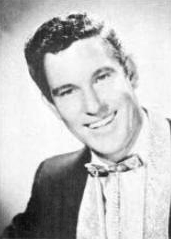
Frederick Segrest, known professionally as Freddie Hart, was an American country musician and songwriter best known for his chart-topping country song and lone pop hit "Easy Loving," which won the Country Music Association Song of the Year award in 1971 and 1972.

"Delta Dawn" is a song written by former child rockabilly star Larry Collins and songwriter Alex Harvey, best known as a 1972 top ten country hit for Tanya Tucker and a number one hit for Helen Reddy in 1973.

"9 to 5" is a song written and originally performed by the American country music entertainer Dolly Parton for the 1980 comedy film of the same name. In addition to appearing on the film soundtrack, the song was the centerpiece of Parton's album 9 to 5 and Odd Jobs, released in late 1980. The song was released as a single in November 1980.
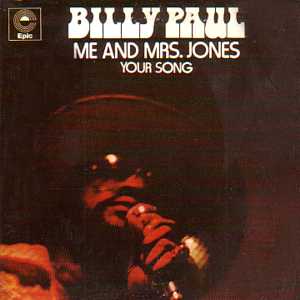
"Me and Mrs. Jones" is a 1972 soul song written by Kenny Gamble, Leon Huff, and Cary Gilbert, and originally recorded by Billy Paul. It describes an extramarital affair between a man and his lover, Mrs. Jones. In the song, the two meet in secret "every day at the same cafe", at 6:30, where they hold hands and talk. The two are caught in a quandary: "We got a thing going on/ We both know that it's wrong/but it's much too strong/to let it go now".
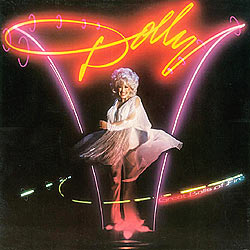
Great Balls of Fire is the twenty-first solo studio album by American singer-songwriter Dolly Parton. It was released on May 28, 1979, by RCA Victor. The album was produced by Dean Parks and Gregg Perry with Parton and Charles Koppelman serving as executive producers. The album peaked at number four on the Billboard Top Country Albums chart and number 40 on the Billboard 200. Two of the album's four singles charted in the top ten of the Billboard Hot Country Songs chart. "You're the Only One" topped the chart, while"Sweet Summer Lovin'" peaked at number seven. The album has been certified Gold in the United States.

"Leave the Pieces" is a song written by Jennifer Hanson and Billy Austin, and recorded by American country music duo The Wreckers for their debut album Stand Still, Look Pretty for which it served as lead single with a February 7, 2006 release. Though it was the first single from their first album, it was The Wreckers' third single overall: they had released two singles in 2005, "The Good Kind", which peaked at #115, and "I'm Feeling You", in collaboration with Santana, which peaked at #55.
"The Happiest Girl in the Whole USA" is a country and pop music song written, composed, and recorded by Donna Fargo. It is written in the voice of a newlywed girl, sung to her new husband. It has since become her signature song.

"Easy Loving" is a song composed by country music singer-songwriter Freddie Hart. Released in the summer of 1971, it became Hart's breakthrough hit and a country music standard.

"Redneck Woman" is a song co-written and recorded by American country music artist Gretchen Wilson. Wilson wrote this song with John Rich. It was released on March 15, 2004, as the lead-off single from her debut studio album, Here for the Party (2004). The song is Wilson's only number-one single on the US Billboard Hot Country Singles & Tracks chart, and it also reached number 22 on the Billboard Hot 100. Internationally, the song found modest success in Australia, Ireland, and the United Kingdom, reaching number 50 on the Australian Singles Chart, number 45 on the Irish Singles Chart, and number 42 on the UK Singles Chart.
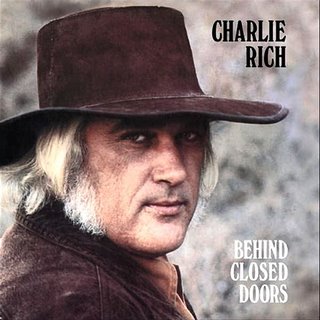
Behind Closed Doors is a 1973 album by Charlie Rich. The album received the Country Music Association award for Album of the Year; the title track was also named CMA's Single of the Year, and Rich was named Best Male Vocalist for his performance on the album. Rich won the 1974 Grammy for Best Country Vocal Performance Male and also took home four Academy of Country Music awards for this album. In 2006, CMT ranked "Behind Closed Doors" No. 37 on its list of the 40 greatest albums in country music.

The discography of American country pop singer Marie Osmond contains 11 studio albums, three compilation albums, one soundtrack album, one video album, six music videos, 33 singles and 2 album appearances. She first gained exposure on television with her siblings' group, The Osmonds. She then signed her own recording contract with MGM Records. Osmond specifically chose to be marketed towards the country field. In 1973, she released her debut single, "Paper Roses." The song reached number one on the Billboard Hot Country Songs chart and crossed into the top five of the Billboard Hot 100. Her debut studio album of the same name also topped Billboard's country albums chart and spent 20 weeks on the survey. It was also her highest charting album on the Billboard 200 all-genre chart, climbing to number 59. She followed this with 1974's "In My Little Corner of the World" and 1975's "Who's Sorry Now." Both singles reached the top 40 of the Billboard country songs chart. In addition, she released two more studio albums with MGM during this period. She then began a duet career with her brother during the latter half of the 1970s. However, in 1977 she recorded a solo album of pop music entitled This Is the Way That I Feel.

"Only Love Can Break a Heart" is a popular song from 1962, performed by the American singer-songwriter Gene Pitney. The song was written by Hal David (words) and Burt Bacharach (music) and appears on Pitney's second album Only Love Can Break a Heart.
If We Make It Through December is the sixteenth studio album by American country singer Merle Haggard and The Strangers, released in 1974. It reached number 4 on the Billboard country album charts. The title track was previously released on Haggard's Christmas release of 1973, A Christmas Present. The single spent four weeks at No. 1 on the Billboard magazine Hot Country Singles chart in December 1973 and January 1974, and cracked the Top 30 of the Billboard Hot 100. "If We Make It Through December" was the No. 2 song of the year on Billboard's Hot Country Singles 1974 year-end chart.
Jack Lebsock is an American country music artist, also known as Jack Grayson, "Blackjack" Jack Grayson and Jack Grayson and Blackjack. He recorded under various labels between 1973 and 1984, charting thirteen times on the Billboard Hot Country Singles charts. Grayson's biggest chart hit is a No. 18-peaking cover of Percy Sledge's "When a Man Loves a Woman." Lebsock was also, in the 1970s, a writer for ABC Music Publishing, having written songs for Roy Clark. He also wrote three of Freddie Hart's singles: "Bless Your Heart", "Super Kind of Woman", and "The First Time".
"My Woman, My Woman, My Wife" is a song written and recorded by American country music artist Marty Robbins. It was released in January 1970 as the first single and title track from the album My Woman, My Woman, My Wife. The song was Robbins' 14th number one on the country chart. The single spent a single week at number one and spent a total of 15 weeks on the country charts. The song won the Grammy Award for Best Country Song in 1971.
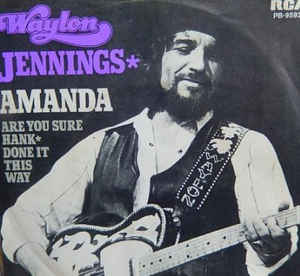
"Amanda" is a 1973 song written by Bob McDill and recorded by both Don Williams (1973) and Waylon Jennings (1974). "Amanda" was Waylon Jennings's eighth solo number one on the country chart. The single stayed at number one for three weeks on the Billboard Hot Country Singles chart.
"You Were Always There" is a song written and recorded by American country music artist Donna Fargo. It was released in May 1973 as the second single from the album My Second Album. The song was Fargo's fourth hit on the country chart and her fourth number one. The single stayed at number one for a single week and spent a total of twelve weeks on the chart.
References
- ↑ Whitburn, Joel (2004). The Billboard Book Of Top 40 Country Hits: 1944-2006, Second edition. Record Research. p. 154.
- ↑ Kent, David (1993). Australian Chart Book 1970–1992 (illustrated ed.). St Ives, N.S.W.: Australian Chart Book. p. 134. ISBN 0-646-11917-6.
- ↑ "Freddie Hart Chart History (Hot Country Songs)". Billboard. Retrieved July 28, 2021.
- ↑ "Hot Country Songs – Year-End 1973". Billboard. Retrieved July 28, 2021.